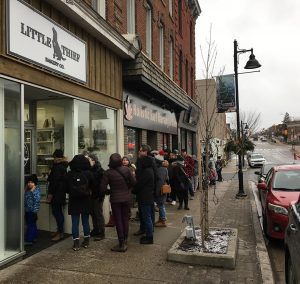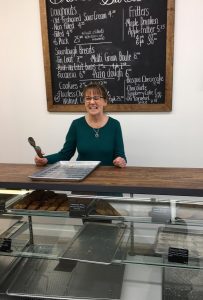
Grand openings haven’t happened much during the past few years around here. The pandemic has made certain of that. So, when we learned that the former Bredin’s Bakery location would reopen last Saturday morning at 10, as the new donut specialty shop – Little Thief Bakery Co. – scores of us lined up outside to buy our weekend supply of fresh bread and pastry.
When I arrived about 9:45, there were probably 50 or 60 people ahead of me. For most of the next hour those of us in line saw happy customers departing the store with their bags and boxes of goodies.
“Did you leave us anything?” we kept asking.
“There’s lots,” they kept saying. There was a lot of fresh pastry, but when I got to the front of the line, about 11 o’clock, the only sweets left were some cookies, a few pastries and two donuts.

Desperately missing Bredin’s wonderful cinnamon buns, I was tempted to take those last two donuts.
But I didn’t have the heart to buy them and deprive my partner in line who’d waited in the cold as long as I had for some donuts. So, I bought a small cheesecake and loaf of bread instead and vowed to come back a little earlier next time.
I should have known this might happen. I remember when my uncle Jimmy and aunt Irene opened their independent bakery in Baltimore, Maryland, back in the 1970s. They had previously provided pastries for a popular highway diner in the city, but always wanted to prepare and sell just baked goods of their own.
They seemed to know (even before the number of Tim Hortons outlets skyrocketed in Canada) that North American consumers love their donuts; at last count Americans ate more than 125 million donuts annually. And cravings during the COVID-19 pandemic drove those numbers even higher; there are more than 6,000 retail bakeries in the U.S. generating $3 billion in annual revenue.
“Many bakeries have seen their sales recover from the early pandemic decline and grow at faster rates compared to before the pandemic,” said Vanessa Qian, an American consumer data analyst. “Bakeries … adapted their operations by offering new services – pickup and delivery, selling staples like coffee, flour and sourdough starters.”
Meanwhile, our buying behaviour since 2020 (when the COVID-19 pandemic arrived) has dramatically changed inside small shops and stores along downtown streets in Canada. For example, from the outset of the virus outbreak, Bredin’s Bakery (Little Thief’s predecessor in town) abided by public health social-distancing guidelines (about six feet of space between customers); consequently, last Saturday a lot of us still lined up outside the bakery respecting that social distance inside.
As a result, during the peak of the rush, about a hundred people patiently waited their turn in an orderly queue that extended out the front door and around the corner.
The lineup reminded me of another far-off bakery in a far-off time. Back in the late 1950s, my father – then a reporter with the Globe and Mail newspaper – enjoyed the chance each summer to rent a cottage (owned by the Globe) in the Lake Erie shoreline community of Port Dover.
The Barris family often shared the cottage with the family of Dad’s writing buddy at the Globe, political columnist George Bain. Like clockwork, every Saturday, Dad and George would walk into downtown Port Dover to the local bakery to stock up on bread and pastry for us for the week.
Like Little Thief last Saturday, the Port Dover bakery was always busy on Saturdays, but unlike COVID times the Port Dover bakery was packed with shoppers all waiting to be served in a crowded space.
In order to be fair, the bakery had adopted a nifty service system. Shoppers entering the shop merely took a plastic card placed in numerical order on a hook just inside the door; when their number was called, they chose their baked goods, paid and left.
Jokers both, Alex and George on this one busy Saturday morning entered the bakery, took their number card and were eventually served. But then, before departing the shop (one hiding the actions of the other) they quickly removed all the plastic number cards from the hook at the door, shuffled them madly out of order, put them back on the hook, and left without being noticed.
They didn’t stick around to watch the resulting chaos inside the bakery. They also managed to avoid being charged with mischief.
Perhaps that’s one of the few benefits of the pandemic – even if we don’t get all our favourites at popular downtown stores, those we do get, are dispensed in a more fair and orderly manner.